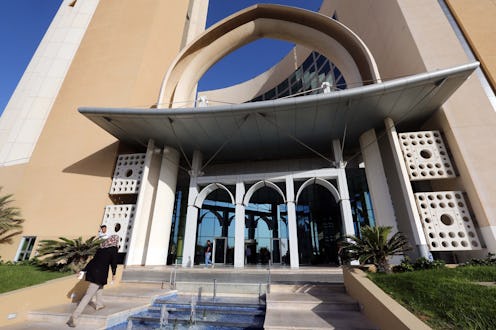News
Attack On Libyan Hotel Shows A Fragmented Country
A prominent Libyan hotel known as a safe haven for visiting dignitaries and foreign journalists has been attacked for the second time in two years. The Corinthia Hotel in Tripoli suffered a deadly terrorist attack from gunmen affiliated with Islamic State, who endured a seven-hour standoff before two of its members detonated a grenade, killing themselves and at least 10 others. Details are still unclear as officials attempt to piece together exactly what occurred but it appears that the gunmen were attempting to enact revenge for the death of a suspected al Qaeda operative originally from Libya who died in the United States a mere two days before standing trial for his alleged crimes.
The Corinthia Hotel opened its doors in 2003, a pivotal year in which Libya's WMDs and weapons program was eliminated. A five-star luxury hotel, it played host to Prime Minister Ali Zeidan in 2012, when political unrest drove him to the hotel to seek asylum. It was Zeidan who took over after Mustafa Abushagur failed to unite the divided General National Congress as well as the country as a whole upon the ousting of dictator Muammar Gaddafi. Zeidan also sought to unite a country, whose militias were forming renegade governments and claiming territories throughout the area.
In October of 2013, armed militants descended upon the Corinthia, kidnapping Zeidan and delivering a fatal blow to his tenure as prime minister. Rather than express concern for the well-being of Zeidan, many within the General National Congress pointed to Zeidan's kidnapping as proof of his failure as a leader. Western countries were dismayed to find that another Libyan prime minister had left office and that Libya itself had yet to reach cohesion.
Libya has faced a heightened unrest since the Arab Spring prompted the ousting of Gaddafi, who assumed power during a coup d'etat in 1969. The country's relationship with the U.S. — who intervened heavily at the beginning of their 2011 civil war, enacting no-fly zones over the country — is conflicted, at best. Though Libya's current national administration has generally been supportive of the U.S., its Islamist oppositional party is distrustful and volatile. The U.S. and other countries recognize current Libyan military commander in chief Khalifa Haftar, but do not recognize or support the warring factions that have claimed Tripoli and Benghazi.
As the Corinthia Hotel acted as an important political point for the downfall of Zeidan, pointing the country in the direction of becoming a potentially failed nation, this latest attack only reaffirms just how fragmented Libya has become. Tripoli is currently controlled by a group known as Libya Dawn, which believes the Corinthia attack was targeted at Prime Minister Omar al-Hassi. He was able to escape without incident.
The attack, which left one American dead, came mere days after UN-mediated peace talks took place in Geneva. But it just shows that, once again, the Corinthia Hotel might change the very nature of politics in a country overrun with factions who simply can't seem to unite their country.
Images: Getty Images (1)
